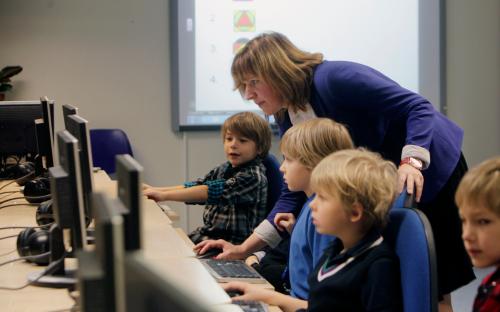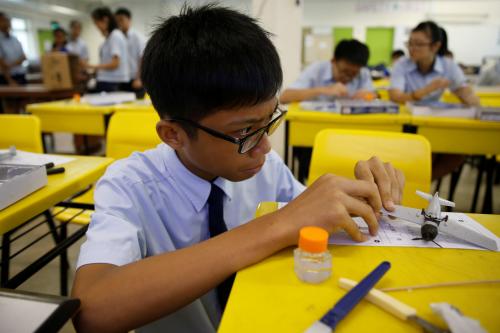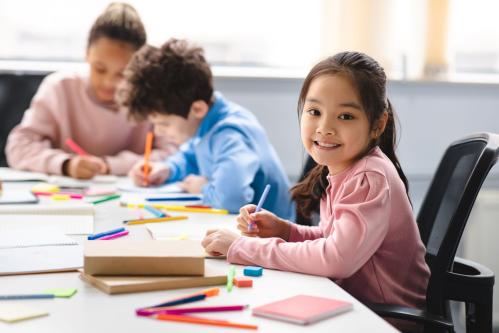This is the third in a four-part blog series on the assessment of 21st century skills.
In August 2016, Finland implemented a new Core Curriculum for Basic Education to ensure that Finnish children and youth will have the knowledge and skills needed to succeed in the future. Aligned with the global movement in formal education to combine generic skills and competencies with traditional academic skills, this new curriculum brings major changes. It places more emphasis on interdisciplinary and generic 21st century skills and competencies, highlights a diversity of assessment practices—in particular, formative assessment, and encourages learner participation and interactions. In fact, interactions are seen as the heart of learning, with teachers guiding students to become lifelong, reflective learners. Together with teachers’ feedback, learners set their own learning goals, solve problems, and assess their learning based on these set goals. These changes are highly challenging, not just for learners, but also for teachers.
In Finland, teacher education is seen as playing a central role in not only changing teacher mindsets and school culture, but also making sure pre-service teachers (i.e., teachers who are still in teacher preparation programs) have adequate 21st century skills. Preparing teacher students for the 21st century learning practices (PREP21), funded by the Academy of Finland, is a consortium project between University of Eastern Finland, University of Jyväskylä, and University of Oulu. PREP21 aims to help pre-service teachers better respond to the demands of 21st century teaching. In Jyväskylä, the focus has been on understanding the factors that affect how students learn collaborative problem-solving skills—a critical skill for the future.
As part of their education, pre-service teachers participate in phenomenon-based large units operating under the assumption that “the way you learn, [is] the way you will teach.” Through these units, they not only acquire knowledge about scientific theories related to learning, but this knowledge is combined with authentic experiences, such as multi-disciplinary courses, facilitating collaborative learning situations, and the opportunity to personally experience how future skills and competencies can be assessed over the course of learning processes as a technology-enhanced practice. To better understand how learners can be more systematically supported in their learning, pre-service teachers engaged in hands-on 21st century skills assessment tasks. In doing so, they gained a better understanding of what collaborative problem-solving tasks entail so that they can apply and adapt these approaches to their own teaching when they enter the workforce.
Given how learning and interaction go hand in hand, PREP21 asked pairs of pre-service teachers to report their thought processes orally while working together on the assessment tasks. Asking how pairs accomplished the tasks, and how their negotiations toward shared understanding were established, shifted the focus from what the individual can do to the relational aspects of the activity. During the task-based interactions, even though pre-service teachers performed well on the assessment tasks individually, the pairs completed the tasks differently and displayed interaction patterns that either enhanced or hindered the collaborative problem-solving process. Our focus following Gerry Stahl’s Group practices: a new way of viewing CSCL was on understanding how change takes place through small-group practices, since these increasingly mediate both cognitive and social processes in modern learning environments. Teachers often allocate learning tasks to pairs or small groups of students, and so understanding how the dynamics of small-group practices influence both learning and learning outcomes is critical knowledge for these teachers.
Typically, research informs practice. But PREP21 reversed the direction, with the pre-service teacher learning environment informing our understanding of collaborative problem solving, and providing new insights that can feed back into the ongoing research, as well as into immediate practice. Particular findings from PREP21 around the relational aspects of collaborative problem-solving activities demonstrated:
- where pre-service teacher pairs tended toward individual and parallel problem solving, less coordination and, therefore, less efficiency was evident
- interaction was critical, in particular, interaction that demonstrated perspective taking—awareness of the experiencing and capacities of the other in the pair
- systematic and continual communication between the pair is essential to ensure progress
These observations are invaluable for teachers’ capacity to implement useful and effective small group activities in the classroom. For PREP21, having pre-service teachers experience and engage in research-based learning activities provides an excellent introduction to the use and development of 21st century skills in the classroom.







Commentary
Research-based practices in preparing teachers before they enter the workforce
February 15, 2018